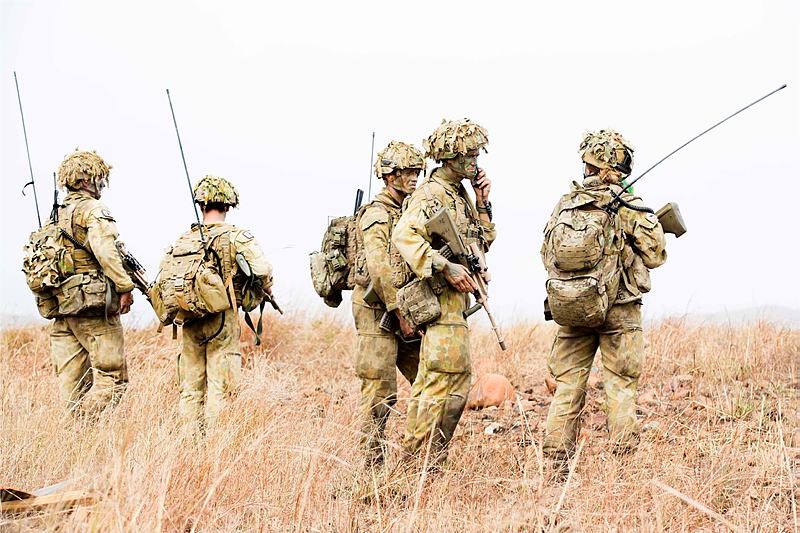The third paper in our Capability Snapshot series was released today. (The fourth, looking at the ADF’s C4ISR networks and capability, will come out next year as part of a larger piece of work.) In many ways the Army is a different beast to the other services, in the sense of it not being structured around major platform delivered capabilities. The Army is a more amorphous organisation, and is able to tailor its configuration to suit a wide variety of circumstances. That makes it a bit harder to assess Army’s capability, but I think I’ve come close.
The main focus of the Australian Army over the past 15 years has been on sustaining combat, training, stabilisation and peacekeeping operations in our near region and the Middle East and Afghanistan theatres. In fact, since the INTERFET mission to East Timor began in 1999, the Army has pretty much been constantly deployed in significant numbers. That’s done two things. First, it’s shown that the structural model that the Army developed during the ‘defence of Australia’ period wasn’t suitable for the operations it was being called on to perform.
The demands of that operational tempo has driven a major rethink of the structure of the Army under Plan Beersheba. In 2010, when ASPI last took an Army snapshot, the three full-time brigades were markedly different. There was one each of infantry, motorised and mechanised brigades. That was workable enough for one-off deployments, for which battlegroups configured for the specific operation could be shaped from elements within each of the brigades. But it was a model that wasn’t suited to extended deployments of brigade size—exactly what was required to sustain forces in Timor-Leste and provide troops for Afghanistan, Iraq, the Solomon Islands and a number of smaller tasks.
When the three brigades were of different types it was hard to replace like for like at the end of a rotation: thus Plan Beersheba was born. Now well advanced, Beersheba’s end state will be three essentially similar brigades, making rotational deployments easier to manage and sustain, as each brigade can now easily rotate through 12-month cycles of ‘one ready (or deployed), one readying and one resetting’.
The other impact of recent operations has been a valuable—and sometimes costly—series of lessons about contemporary battlefields. The rise of well-armed and agile non-state groups means that even relatively low-level conflicts can be lethal. As Western militaries found to their cost in Iraq and Afghanistan, it’s no longer safe to take lightly armoured or soft-skinned vehicles into conflict zones.
There’s a trend towards increased protection against improvised explosive devices and other threats. Army’s M-113 armoured personnel carriers have been around for half a century and, despite an expensive upgrade, they aren’t fit for purpose today. The Bushmaster vehicle has proven to be a great success in protecting its passengers and the ASLAV has been an excellent armed reconnaissance vehicle, but it’s clear that greater protection is going to be needed in the future.
Greater protection comes at a greater cost, and the Army’s ability to replace its entire fleet of vehicles will depend on money. That isn’t a new problem. In 2010, ASPI noted that a significant and wide-ranging upgrading of the Army’s protected mobility vehicles and armour wasn’t guaranteed to happen any time soon, given the 2009 Defence White Paper’s expensive naval initiatives.
Not much has changed—the August 2015 announcement that the two major naval shipbuilding projects were being brought forward, plus the looming $20 billion-plus submarine project, means that the Army will again have to fight to make its case. Whether they’ll be successful remains to be seen. Like the RAAF and the RAN, the Army needs a major recapitalisation of its equipment. Unlike the RAAF and RAN, the Army has never been especially good at getting large sums of money for recapitalisation.
But the artillery is all new, and the Abrams tanks are still pretty capable (though an upgrade will be necessary at some stage to keep them near the US baseline). And there’s some light at the end of the tunnel with Army aviation: after long development periods, the Tiger armed reconnaissance and the MRH-90 battlefield lift helicopters are finally reaching maturity. And the purchase of seven new build F-model Chinooks through an FMS purchase (ahead of schedule and on budget, natch) has boosted the medium-lift capability.
Finally, there’s the people aspect of capability. Like all of the services, Army has some specialisations in which depth is lacking. Our 2010 snapshot noted that personnel in specialist trades like medicine, logistics, combat engineering, special forces and intelligence had been required to make multiple deployments because of a lack of alternatives. Some progress has been made in adding depth, but recruitment and retention of specialists is a constant concern. In principle, Plan Beersheba will add depth to support areas by making each brigade more self-sufficient. But some of the specialist units are still ‘one-shot’ capabilities rather than Beersheba’s ideal triumvirate.


